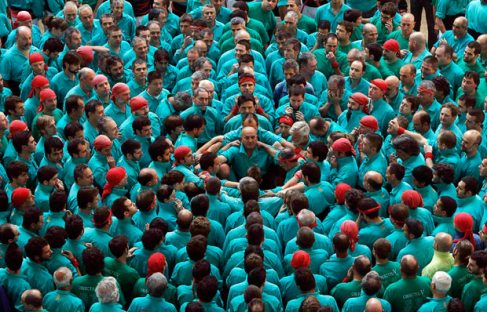By way that you are reading this post, you are currently accessing an online experience. The utterances on this post, and those on your blog and the blogs of the rest of the class, is one of the virtual ways we interact. With that said, take a moment and think how much time you’ve spent online today – consuming information, creating content, or exchanging conversation. How has this time in a virtual space affected that of your immediate space?
In Chapter 10, How social production transforms markets and freedom, of The Wealth of Nations, Benkler addresses claims that these virtual interactions and relationships are stripping the gameinshaft fabric of our societies, stripping us down to an existience of isolation. Benkler argues against these claims and proposed the opposite: these interactions are enhancing this fabric and allowing us new types of relationships.
A Dystopian View
Optimism about the potential of online relationships to connect us was prevalent, but by the late new millenium dystopic doubt began to creep forward. Initial findings by Kraut (1998) and the Stanford Institute for the Quantitative Study of Society (2000) painted a picture of disintegration. Their findings insisted that these virtual relationships were over-absorbent, replacing the time we spent with our most important and significant real world relationships. Coleman & Granovetter and Putnam argued the importance of these face-to-face interactions to building social capital. Social capital, they cited, was integral to economic status and civic engagement. Thus, virtual relationships would only bankrupt our opportunity for social capital.
A Networked Society
Benkler argued back, firstly challenging the significance of the empirical evidence provided by Kraut and the Stanford Institute, and secondly, offering a new theoretical frame for social experiences in a networked society. Benkler affirmed that we are not fixed entities with unchanging needs amid changing social conditions and relations. He argued that our relationships are shifting to networked individuals who are more dependent on a combination of strong and weak ties, switching between networks to weave a fluid web of relationships.
Strong & Weak Ties
Benkler provided numerous examples of how the internet enhances our thick ties: it allows us to connect with loved ones over distance and actually replaces time with other technologies (e.g TVs and malls) rather than face-to-face time with close ties.
Further to enhancing strong ties, Benkler points out that the internet has also allowed us to discover and manage weak ties – ties that allow us to move information across networks or achieve effectancy. These weak ties do not compete with strong ties, they are weaved into the fabric of our personal network.
Benkler ends by reviewing the ways the internet and its tools allows to connect, be it one-to-one, many-to-one, one-to-many, or many-to-many. These tools allows us not only to send messages, but actually collaborate beyond constraints of time and space.
Ultimately Benkler reassures us of a utopian view of the internet and its possibilities for human connection. However, by illustrating how this capacity is changing in conjunction with Tim Berner-Lee’s affirmation that the web is “not complete”, I feel this article is not only about confirming the positive effects of the internet. What it has done is kept an important discourse going between dystopian and utopian views about the internet as it evolves.
We should be excited about the internet’s revolution, but it’s also fair to critique where the internet is heading and its potential impact.
For now, you’ve spent enough time reading this post and connecting with me. Please enjoy some well-deserved time with strong ties or some wine.



